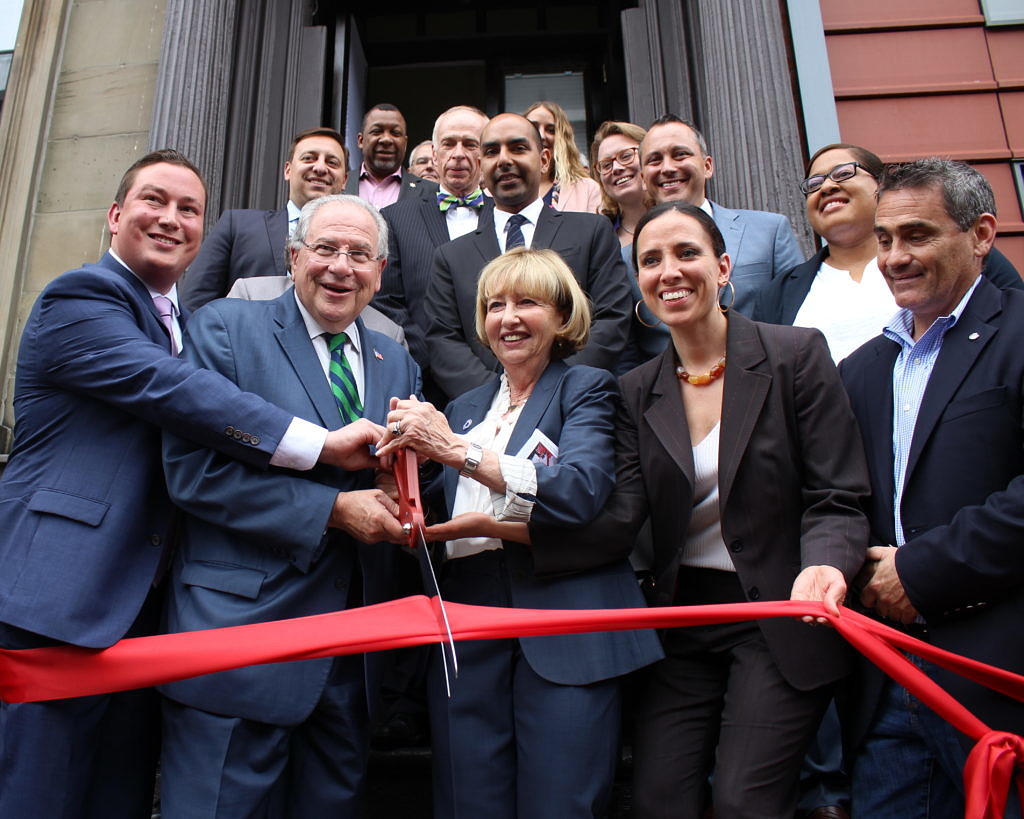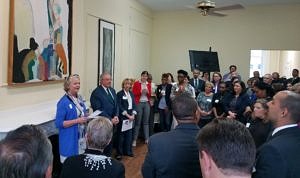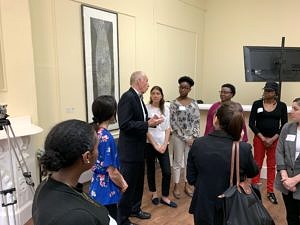
Massachusetts state legislators cut the ribbon at the McGrath House community-based residential reentry program for women on June 20, 2019. Front row, left to right: Rep. Dan Cullinane, House Speaker Robert DeLeo, Senate Majority Leader Cynthia Creem, Sen. Sonia Chang-Diaz, Boston City Councilor Frank Baker. Second row: Rep. Jon Santiago, Rep. Chynah Tyler. Third row: Sen. Joseph Boncore, Community Resources for Justice President & CEO John Larivee, Rep. Christine Barber, Rep. Aaron Michlewitz. Back row: Suffolk County Sheriff Steven Tompkins, CRJ Director of Innovation, Implementation, and Development Gabriella Priest.
BOSTON – McGrath House, Massachusetts’ only reentry program of its kind exclusively serving women transitioning from incarceration to the community, has reopened, restoring critical services that help change lives and reduce recidivism.
House Speaker Robert A. DeLeo and Senate Majority Leader Cynthia Creem, strong advocates for reentry services, cut the ribbon during a reopening ceremony on June 20 at the center, located on Massachusetts Avenue in Boston’s South End. Also in attendance were legislative leaders, including state Sens. Sonia Chang-Diaz and Joseph Boncore, and state Reps. Aaron Michlewitz, Liz Malia, Dan Cullinane, Christine Barber, Chynah Tyler, and Jon Santiago. Trial Court Chief Justice Paula Carey, Boston Municipal Court Chief Justice Robert Ronquillo, Superior Court Chief Justice Judith Fabricant, also attended, as well as Commissioner of Probation Ed Dolan, Boston City Councilor Frank Baker, and Suffolk County Sheriff Steven Tompkins.
Representatives from Community Resources for Justice, the organization that runs McGrath House and other reentry programs, also attended.
“The House has a history of support for programs aimed at reducing recidivism, and has worked to make sweeping criminal justice reforms to create a more equitable and just system by supporting our youngest and most vulnerable residents,” said Speaker DeLeo. “Congratulations to the McGrath House on this milestone, and thank you to the staff for their hard work to help those transitioning back into their communities.”
More coverage:
CommonWealth
Bay State Banner
Spare Change News
Neighborhood Network News
“It’s hard to transition from incarceration to the community, and it’s even harder for women,” Majority Leader Creem said. “The reopening of McGrath House is just the beginning of more great things to come because our work isn’t done.”

CRJ Vice President for Justice Services Ellen Donnarumma addresses the crowd during the McGrath House reopening celebration on June 20.
McGrath House is the only community-based residential reentry center in Massachusetts that exclusively serves women who are completing the end of their sentences at state and county facilities and women who are on probation or parole. Participants reside at the program, typically for three to six months, and receive individualized assistance securing housing, finding jobs, accessing mental health or substance use counseling, and other supports to help them succeed in the community.
Rosa, a successful graduate of McGrath House, first came to the program without even a driver’s license or Social Security card, common barriers to finding housing or employment for people leaving incarceration. McGrath House staff helped her reconnect with her family, realize her potential, and pursue her goal of going back to school. She recently enrolled in Suffolk University.
Women who’ve been involved in the criminal justice system are too often left behind and without a voice, Rosa said.
“Programs like this are what’s going to help us,” she said. “We’re not going to become a statistic. I want to be somebody. My past does not define what I am.”
The reopening ceremony took place 14 months after Community Resources for Justice was forced to close McGrath House due to loss of funding. The closure helped spur a wave of advocacy from community groups, service providers, prosecutors, defense attorneys, law enforcement officials, lawmakers, and many others. In response, the Massachusetts Legislature included $5 million for community-based residential reentry programs in a new line item in the FY2019 budget. CRJ was awarded a portion of those funds through a statewide competitive process to reopen McGrath House.
Incarcerated women face unique challenges, and research shows that women realize greater benefits in gender-specific reentry programs. Most incarcerated women have also been victims of violence and they are more likely than incarcerated men to have a history of mental illness.

CRJ President and CEO John Larivee gives a tour of McGrath House during the reopening celebration on June 20.
“Reopening McGrath House will fill a gap in services and provide a valuable resource for women to return to the community with a solid foundation for a new life,” said Scott Harshbarger, chairman of CRJ’s board of directors and former Massachusetts attorney general.
First opened in 1975, McGrath House has capacity to provide services to up to 33 women at a time. Residents are referred to the program by county sheriffs’ departments, the Department of Correction, the Parole Board, or the Massachusetts Probation Service.
“McGrath House has a long history of supporting women to thrive, move beyond their past, and create successful futures for themselves, their families, and their communities,” said CRJ President and CEO John Larivee. “We’re thrilled to have the opportunity to continue that legacy and provide a space for women’s resilience and their strength to grow and flourish.”
Community-based residential reentry centers are typically operated by private, nonprofit organizations and combine intensive case management, support, and accountability for individuals during the end of their sentence as they prepare to transition from incarceration back into the community.
Participation in reentry programming has been shown to reduce recidivism by up to 25 percent.
“Community based reentry services are an integral part of a justice system that sees as its mission just that – the full and successful transition of a person from a cell to a productive member of society,” Chief Justice Carey said. “The reopening of McGrath House expresses that commitment to make that transition possible for justice system involved women in the Commonwealth.”
CRJ’s community partner organizations Mothers for Justice and Equality, Dorchester Bay Economic Development, Project Place, Pine Street Inn, Boston Area Rape Crisis Center, Whittier Street Health Center, and Prisoners’ Legal Services also attended the reopening event. CRJ also partners with Haley House and the Gavin Foundation.